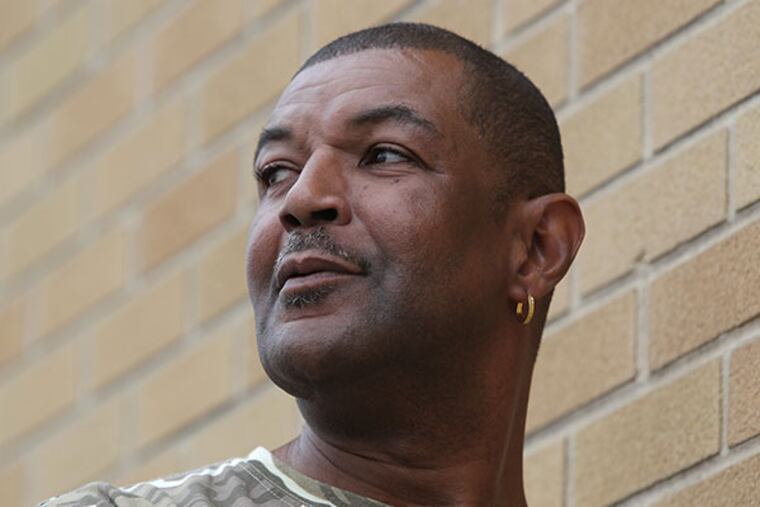Getting homeless back on track with apartments
Victor Anderson was a mess for two decades. He was not even himself. He went by Kenny, the Homeless Street Entertainer. "I would tell jokes, give out knowledge and stuff," he said, pocketing change for a fix. "But I thought I was going to be one of those people who was going to die out there."

Victor Anderson was a mess for two decades. He was not even himself. He went by Kenny, the Homeless Street Entertainer. "I would tell jokes, give out knowledge and stuff," he said, pocketing change for a fix. "But I thought I was going to be one of those people who was going to die out there."
Victor was a chronic addict, his home a grate or Dumpster except for the six years he was incarcerated for burglary and robbery.
Prison did not save Victor. An apartment did.
Pathways to Housing PA, one of four programs in a national network, gave Victor a residence without any preconditions, not even ending 30 years drowning in drug dependency.
Transitional group housing does not always work, especially for people like Victor with serious, persistent mental illnesses like personality disorders.
Fearful and slow to trust, "they can't live with other people," said Christine Simiriglia, Pathways to Housing PA's executive director. Shelters prove a disaster. Victor knew and hated them all. And to require clients to become clean and sober before entering housing is to court failure.
"After five years, we're seeing people doing well. We look at housing as health-care prevention," Simiriglia said. "Many miracles are happening every day."
Like Victor, 19 months clean this month.
He takes his meds, earned a GED, repaired shattered relationships with siblings, he said. His one-bedroom apartment is "beautiful, so clean," a futon in the living room, a television ("I can't lie, I like the love stories and Scandal"), his culinary specialty collard greens with smoked turkey butt. "I feel real safe. I feel secure," said Victor, 55, his hair trim, his neck dabbed with cologne.
In his Northeast apartment building, Victor helps paint and clean the hallways. His diabetes and high blood pressure are under control, he told me, "but hearing voices will always be there."
In five years, Pathways to Housing PA has moved 400 Philadelphians like Victor off our streets, the overwhelming majority men, almost half veterans. The housing retention rate for Philadelphians once deemed "most difficult to house," those with chronic mental illness, is an extraordinary 89 percent.
The housing-first solution is simple, cost-effective, and inspired, the brainchild of Pathways to Housing's Sam Tsemberis, who founded the program in New York. Give a homeless person housing and he is no longer homeless. Provide support with social workers, nurses, and psychiatrists, often through in-home visits, and participants become healthier. Their medical costs diminish, and they learn to live more independently.
"The whole thing seems counterintuitive, to give a mentally ill person who may be using drugs an apartment, yet the success rate is very high and the recidivism rate is very low," said Center City District CEO Paul Levy, a Pathways to Housing PA board member. "We ought to be looking at more programs like this that are working and are more cost-effective."
Pathways to Housing's national organization projects it costs $57 a night to provide independent housing, far more affordable than $73 to sleep in a shelter, $164 locked in prison, or $519 spent in the emergency room.
Clients are placed throughout the city in apartment buildings where they are the minority of tenants - Victor lives in a 10-unit building - thereby avoiding neighborhood opposition, the persistent NIMBYism. Because rents are paid from government subsidies for the mentally ill and veterans, Simiriglia said, "landlords now call us for tenants because they know they're going to get paid on time. They become another group of our stakeholders and supporters."
The housing-first model in Philadelphia requires enormous support, an $8 million annual budget and a staff of 55 dedicated, mission-driven workers to negotiate the shoals of government funding and agencies. Participants are invited to come in daily to the offices near Einstein Medical Center, but home visits are routine.
When Victor was first offered housing three years ago, he was incredulous. "Don't lie to me," he told them. "Who in their right mind is going to give somebody like me something for nothing?"
Victor now volunteers at two churches, unloading food off trucks, churches that helped him during his many years on the streets. "I love helping people. I do it so maybe I will reach someone else like me," he said. "This is now my mission in life, to give back."
For more information about Pathways to Housing, http://pathwaystohousing.org/pa/
215-854-2586 @kheller